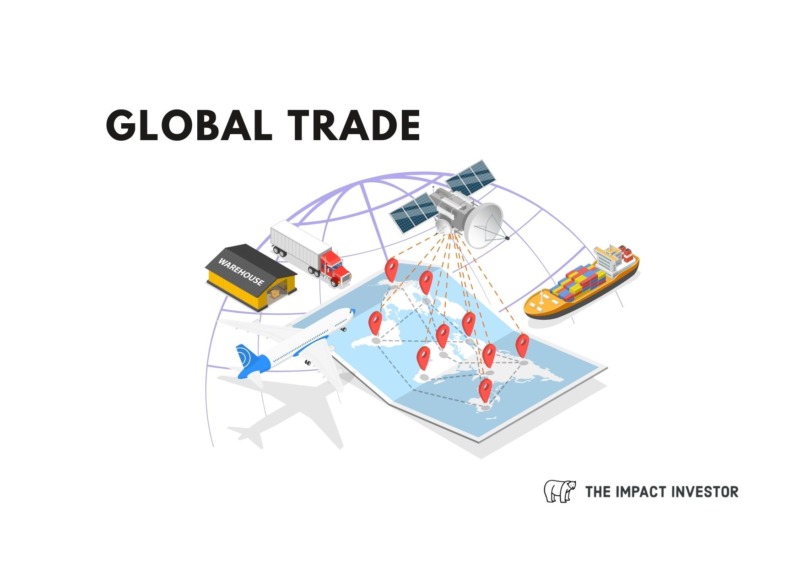At this point, globalization is much more than just a big part of modern society. It’s so well integrated into how modern businesses and brands do things that most people aren’t entirely conscious of where it ends, and the rest of the global economy begins. Here’s why globalization is good for future generations.
They’re not often aware of the many benefits of globalization, either. For example, globalization makes modern conveniences like washing machines, automobiles, computers, and more easier to obtain, raising the global standard of living considerably.
In this way, globalization makes modern living easier and more seamless overall. It makes many aspects of starting, managing, and growing a business easier, as well.
Globalization, of course, comes with its share of challenges. But it’s a highly positive concept for the global marketplace, especially when approached with knowledge and understanding. Here’s a closer look at everything you need to know.
Table of Contents
- What Is Globalization?
- How Globalization Is Good for Everyone: What Are the 5 Positive Effects of Globalization?
- 1. Access to new markets via global trade
- 2. Increased work opportunities within many developing countries
- 3. Better overall economic growth for developing nations
- 4. Competitive advantages for individual companies
- 5. Rising global standards that benefit everyone
- What Potential Globalization Drawbacks Should Companies Consider?
- Potential exploitation of the labor force
- Too much competition for small or local economies
- Potential trade deficit issues
- Potential job loss on a local scale
- Preventing Potential Issues: How Can We Ensure Globalization Is Good for Everyone?
- Implementing and enforcing trade policies
- Actively assisting developing countries in joining the global marketplace
- Is Globalization Good for the World and Why?
- Globalization FAQs
- Has globalization changed culture?
- Does globalization threaten diversity?
- Is globalization an opportunity or a threat?
- What is the main problem of globalization?
What Is Globalization?
Globalization describes the process by which companies, brands, organizations, and corporations expand their operations to include foreign and local markets.
Some key factors that characterize globalized businesses include:
- Size: Global companies tend to be large with many products, as well as presences in multiple other countries
- Technology: Global companies generally leverage the best and latest in cutting-edge technology, as they need to measure up to rising international standards
- Central control: Although a global company may have many branches or presences throughout the world economy, its standards and methods are set and controlled by centralized management
- Awareness: Participating in global trade requires knowledge of key cultural differences and the implementation of methods that take those differences into proper consideration
How Globalization Is Good for Everyone: What Are the 5 Positive Effects of Globalization?
Although the choice to go global presents companies from developed countries with certain challenges, it also comes with multiple clear benefits. But what is good about globalization on a worldwide scale, and how does it benefit other cultures, in particular?
Here’s a look at five of the most crucial advantages of globalization for businesses, economies, and consumers alike.
1. Access to new markets via global trade

International trade and expansion open up a business’s options when it comes to economic growth. Said business instantly gains access to entirely new markets and demographics — markets that could take a shine to its best products and offerings.
Factors like free trade agreements, more supply chains, and affordable labor costs allow more different businesses to contribute to an increasingly diverse marketplace. They also make it possible to lower prices, making products easier for the average consumer to afford.
2. Increased work opportunities within many developing countries

Once businesses evolve into multinational corporations, they instantly gain access to a much larger workforce to draw from.
Naturally, this is terrific for the business, as they’re no longer restricted by national borders when accessing new talent. They can hire tech geniuses from India, expert marketers from Latin America, product developers from Europe, and more from different countries as needed.
This is highly beneficial for the rest of the world, as well — especially developing countries where local opportunities might be limited at best. Talented people who might go unnoticed and undiscovered can start taking advantage of new opportunities to develop their abilities and succeed.
See Related: What is the Sharing Economy? Important Pros & Cons to Know
3. Better overall economic growth for developing nations

The impressive growth both industrialized countries and developing economies tend to experience is frequently cited as one of the most important globalization benefits.
The reason for this is simple. When products, goods, and services are more widely available at a lower cost, more people can afford to purchase them. This, in turn, leads to higher production quality, as well as more jobs available for those who work for global companies.
4. Competitive advantages for individual companies

The more accessible a given company can afford to make its products, the more of a competitive advantage it will have in the global market overall. (Again, affordable labor and easy access to new technology make this possible.)
Additional considerations, like increased competition among transportation service providers or suppliers, can also contribute to lower cost margins in these areas.
The vast connectivity the internet, social media, and more bring also helps make globalization an accessible, affordable option for smaller businesses and startups. More entrepreneurs and brand owners can seriously consider it, regardless of the country they reside in.
5. Rising global standards that benefit everyone

In a general sense, globalization results in increased trade and higher universal standards across the board, including for poor countries, developing nations, and new countries still finding their footing within the worldwide economy.
Standards that regulate product safety and human rights grow higher, as do consumer expectations regarding such factors.
As a result, consumers not only benefit from comparing buying options from different countries around the world, but they can purchase goods from a different country with a lot more confidence that expected quality standards will be met.
What Potential Globalization Drawbacks Should Companies Consider?
Naturally, there are those out there with a negative public opinion about globalization, and with good reason. As wonderful as it can be for both local economies and national economies alike, it’s important to approach globalization with care to avoid the potential pitfalls.
Every company head thinking of going global should consider the following, as well as explore the potential solutions. Which of these is a reason for opposing globalization?
Potential exploitation of the labor force
As great as the influx of new job opportunities can be for workers in many countries throughout the modern world, it’s important to take steps to prevent exploitation.
Richer nations and wealthy economies can easily exploit poor countries and weaker, less stable economies by exploiting cheap labor. In especially bad cases, problems like human trafficking, sweatshop conditions, and other serious human rights violations can become massive problems.
This can also affect the environment and further degradation of natural resources, precious metals, etc.
Too much competition for small or local economies
As great as free trade can be for a growing economy in a developing country, it can be hard on small or local businesses from those communities. Once globalization reaches these countries, local merchants and service providers must compete with larger, multinational corporations.
While some competition is good, as it raises standards for everyone, many local businesses may not have access to the substantial upfront capital it may take to keep up.
See Related: What is the Sharing Economy? Important Pros & Cons to Know
Potential trade deficit issues
A trade deficit is an imbalance that occurs when a particular country begins spending more capital on imports than it’s making via exports.
As with an individual living beyond their means, it will eventually become necessary for a country with a trade deficit to borrow money to stay afloat, allow foreign countries to invest in some of its assets or both.
Naturally, this can leave a less advantaged or developing country in a sticky situation, especially if foreign investors decide to rethink those investments later on down the line.
Potential job loss on a local scale
The potential negative impacts of mismanaged globalization don’t just affect other countries with weaker economies. When global companies outsource too much of their labor, the skills of middle-class American workers and others aren’t as in demand.
For example, the China-U.S. trade deficit rendered a whopping 3.7 million jobs obsolete between 2001 and 2018. Such losses hit industries like manufacturing especially hard, as many associated jobs are easy to outsource.
It’s also not uncommon for some businesses to treat presences worldwide as tax havens and take advantage of them to avoid paying taxes, get around important local government policies, etc.
Preventing Potential Issues: How Can We Ensure Globalization Is Good for Everyone?
Like the effects of the original Industrial Revolution, globalization and international expansion are now permanent parts of the mix when it comes to the global economy.
In other words, it’s not possible to undo globalization, nor is it actually desirable because of the many economic benefits it brings to the table. But it can certainly be improved both now and moving forward.
Here are a few suggestions that can help reduce or eliminate the blowback globalization can cause.
Implementing and enforcing trade policies
Just as laws and regulations help keep the peace within a single country, city, or region, they can also help keep things fair, safe, and equitable between nations.
For example, the Economic Policy Institute is a non-profit organization that helps research and study the way globalization affects emerging economic trends, business policies, and various relationships between nations.
Actively enforcing existing trade laws, setting strict rules to keep global competition in check, and so forth help keep the playing field equal for everyone, as well.
Actively assisting developing countries in joining the global marketplace
Strengthening the world’s approach to finances can help maximize the benefits of globalization while curbing the drawbacks even further. There are already many helpful options in place.
For example, the International Monetary Fund works to ensure all 190 world countries with membership have the best possible chance at succeeding and achieving sustainable growth.
Developed countries can also better support international trade by providing aid to poorer countries, implementing financial safety nets, and actively reducing poverty worldwide. Additional examples include:
- Upgrading educational opportunities and training options
- Establishing and enforcing policies that fight corruption and protect workers’ rights
- Ensuring barriers to international trade are low and associated costs are affordable
- Investing in emerging tech and freely sharing technology and scientific advances with other nations
- Investing in displaced or struggling communities, both domestically and worldwide
See Related: What is a Circular Economy? Here’s How it Works
Is Globalization Good for the World and Why?
Yes, when proper policies are enacted and rules that are fair to everyone are enforced, globalization offers so much that’s positive to the rest of the world. Under ideal circumstances where fair trade is a solid priority, globalization:
- Keeps manufacturing costs low and makes many goods more accessible to more of the world’s people
- Creates new markets, boosts trade, improves productivity, and helps economies around the world to grow sustainably
- Creates potential job opportunities, especially for underdeveloped countries and regions
- Supports technological advances and worldwide connection
- Encourages increased global awareness of various products, business opportunities, and more
It’s up to modern businesses and developed countries to keep opportunities accessible to everyone. Because when every country can access the advantages of globalization, everyone wins.
Globalization FAQs
Has globalization changed culture?
Many scholars feel globalization has contributed to a multicultural world where countries worldwide are more interconnected. Among other benefits, it’s easier for individuals to access and learn about new cultures, products, and technologies.
Does globalization threaten diversity?
Implementing universal trade, safety, and business standards may dissolve certain global differences that can act as barriers to the larger world economy. However, greater inclusion, access to talent from a global workforce, and more actually support greater diversity.
Is globalization an opportunity or a threat?
When approached wisely and with integrity, globalization is an opportunity. It helps facilitate growth, economic opportunities, and more worldwide, including for poor and underdeveloped countries.
What is the main problem of globalization?
The largest challenges attached to globalization are legal compliance and the potential exploitation of the environment and people. However, it is more than possible to overcome these challenges with careful forethought, regulations, and enforcement of key policies.
Related Resources
- Net Zero: Achieving Global Climate Goals Efficiently and Effectively
- Best Globalization Jobs & Careers
- Best Circular Economy Jobs to Start Your Sustainable Career
Kyle Kroeger, esteemed Purdue University alum and accomplished finance professional, brings a decade of invaluable experience from diverse finance roles in both small and large firms. An astute investor himself, Kyle adeptly navigates the spheres of corporate and client-side finance, always guiding with a principal investor’s sharp acumen.
Hailing from a lineage of industrious Midwestern entrepreneurs and creatives, his business instincts are deeply ingrained. This background fuels his entrepreneurial spirit and underpins his commitment to responsible investment. As the Founder and Owner of The Impact Investor, Kyle fervently advocates for increased awareness of ethically invested funds, empowering individuals to make judicious investment decisions.
Striving to marry financial prudence with positive societal impact, Kyle imparts practical strategies for saving and investing, underlined by a robust ethos of conscientious capitalism. His ambition transcends personal gain, aiming instead to spark transformative global change through the power of responsible investment.
When not immersed in the world of finance, he’s continually captivated by the cultural richness of new cities, relishing the opportunity to learn from diverse societies. This passion for travel is eloquently documented on his site, ViaTravelers.com, where you can delve into his unique experiences via his author profile.
